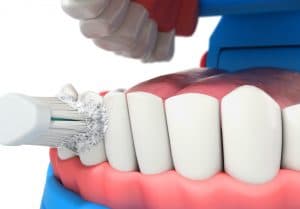 When plaque and tartar gather on your teeth surfaces, you need professional cleaning to successfully remove it all. Tartar, which is a calcified form of plaque, can’t be cleaned off your teeth with toothpaste and water. It takes professional care and equipment. However, when plaque and tartar develop on the roots of your teeth, which rest underneath your gums, even professional teeth cleaning might not be enough to remove the threat they pose to your smile. Deep cleaning, or scaling and root planing, may be the only solution to preventing or stopping the gingivitis that follows this buildup.
When plaque and tartar gather on your teeth surfaces, you need professional cleaning to successfully remove it all. Tartar, which is a calcified form of plaque, can’t be cleaned off your teeth with toothpaste and water. It takes professional care and equipment. However, when plaque and tartar develop on the roots of your teeth, which rest underneath your gums, even professional teeth cleaning might not be enough to remove the threat they pose to your smile. Deep cleaning, or scaling and root planing, may be the only solution to preventing or stopping the gingivitis that follows this buildup.
Your gums start to look red and inflamed
Gingivitis is the name of the infection that develops when enough oral bacteria accumulate on your teeth roots. The plaque and tartar they form allow the bacteria to cling strongly to the surfaces of your teeth roots, and from there, they can infect your gum tissues from underneath. One of the first noticeable signs of this infection is an increasing redness in your gums, or discoloration in certain areas of them. This is often accompanied by excessive inflammation in the gum tissues, which you might not immediately notice without closely inspecting your gums.
Your tissues bleed when you brush and floss
The redness and inflammation that mark early gingivitis are the result of the irritation that oral bacteria cause your tissues. As gingivitis progresses, this irritation can lead to tissue damage, causing your gums to bleed anytime they’re subject to pressure. For example, every time you brush and floss your teeth, you may notice spots of blood mixed in with your saliva and toothpaste. This should be alarming, but the minimal amount of blood and lack of physical discomfort can often cause patients to overlook the seriousness of it.
You notice your breath getting worse and worse
There are many different reasons for developing bad breath, some of them not as serious as chronic gum disease. However, if your bad breath is accompanied by signs of irritation or inflammation in your gums, then it may likely be a corresponding symptom of gum disease that’s growing worse. You should take the sign seriously and seek treatment as soon as possible. With deep cleaning, we can carefully clean away the bacteria that cling to your teeth roots, allowing your gums to recover and reattach to your teeth roots.
Schedule a deep cleaning with us
These and other signs could warn you that gingivitis is present, and deep cleaning could be necessary to protect your smile from more severe gum disease. To learn more, schedule an appointment with us by calling Dreem Dentistry in Leawood, KS, today at 913-681-5500. We also serve patients who live in Overland Park and all surrounding communities.



